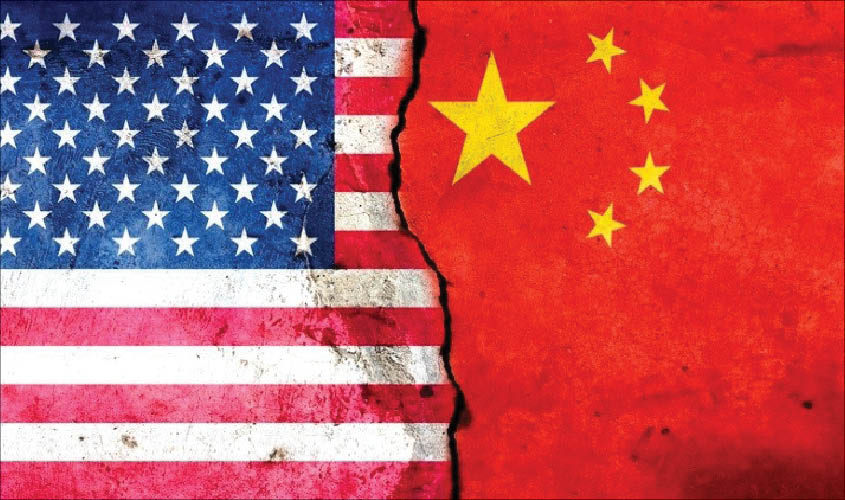Chinese technology companies will find access to international technology supply chains disrupted.
The US decision this April banning China’s fastest growing telecommunications company, Zhongxing Telecommunication Equipment (ZTE) Corporation, from doing business in the United States and, more importantly, China from purchasing semi-conductors, laser surveillance tubes etc., essential for hi-tech products, artificial intelligence (AI) etc., has been a major blow to Beijing. It heralds that China’s hi-technology sector, which is a priority for China’s leadership as exemplified by the State Council issuing a “National Strategy for AI Development” in July 2017 and the government investing US$1 billion in private Chinese AI start-ups, is in the cross-hairs of the Donald Trump administration. The sanctions could severely retard China’s “rise” and effort to rival the US by 2050—the centenary of the founding of the People’s Republic of China (PRC).
ZTE is closely tied to China’s security apparatus, which, along with China’s military state-owned Enterprises (SoEs), has substantial share-holdings in the company which is documented to have been involved in espionage and bribery cases in various countries. The ban on ZTE was soon escalated with US sanctions against 44 Chinese military entities including, significantly, the Equipment Development Department—formerly the General Armaments Department—of China’s Central Military Commission (CMC) and the Russian military export company Rosoboronexport.
Intriguing in this last case is the specific sanction on China’s People’s Liberation Army (PLA) Lieutenant General Li Shangfu, Director of the CMC’s Equipment Development Department. Though the US order says it is for “engaging in significant transactions with persons” sanctioned under CAATSA, no other Chief Executive of a military entity has been sanctioned by the US in this round. 58-year old Li Shangfu is an aerospace engineer and son of a “Red Army” veteran. He was earlier Deputy Commander of the recently constituted PLA Rocket Force. His being named suggests not only a warning against China continuing to enter into other deals with Russian companies, but that Li Shangfu possibly has assets or children or relatives studying in the US.
US sanctions have immediately adversely affected China’s security and high-technology sectors. The US and European countries, within days, ceased supplying critical components like graphic processing, imaging and laser generating chips to China. This has impacted China’s vast multi-billion dollar surveillance, Skynet Project. 170 million cameras using AI for identifying any individual anywhere in China within minutes have already been installed under Skynet, with plans to install another 400 million by 2020. China planned to buy CCTV cameras and related security equipment costing US$20 billion in 2019. Li Guoping, Deputy Director of the Nanjing Institute of Astronomical Optics and Technology at the Chinese Academy of Sciences in Jiangsu Province, said the US sanction banning export to China of advanced infrared sensors had forced China to stop work on numerous branches of astronomy research.
Despite paying large sums to lobbyists—it paid just one firm nearly US$80,000 between May and June—ZTE has effectively been crippled since the prohibition on purchase of sensitive equipment remains in force till 2025. Countries where ZTE, Huawei and other Chinese companies have a pronounced footprint like Bangladesh, Nepal, Pakistan, Afghanistan, Sri Lanka and, to an extent India, could become vulnerable. Chinese technology companies will find access to international technology supply chains disrupted, making it difficult to source hi-tech equipment and service existing commitments. Revenues of companies like ZTE and Huawei have already dropped.
Other prominent Chinese technology and IT companies have also been impacted. Stock prices of Hikvision, the world’s largest video surveillance company, have dropped over 60% since August. Stocks of China’s three other largest security technology companies, namely Dahua, Uniview and Tiandy Technologies have dropped 20%. Shares of companies affiliated to the 44 Chinese military SoEs sanctioned by the US like GCI Science & Technology, the parent company of Hebei Far East Communications and Glarun Technology, a subsidiary of CETC, have slumped by over 7% on the Shenzhen exchange and 6% on the Shanghai markets respectively.
While convinced that the Trump administration’s actions are to “contain” China, Chinese officials and analysts say the US actions could actually prove to be an incentive for indigenous innovation. Soon after the ban on ZTE, US-based cyber security outfits reported a surge in hacking and cyber theft emanating from China. Chinese President Xi Jinping has addressed a series of high-level meetings stressing “military-civil fusion” and urging military units, institutes and academic research institutions to share technologies to promote innovation. He has also been emphasising self-reliance and especially indigenous technological innovation. Touring Heilongjiang province, Xi Jinping candidly said on 26 September 2018 that China faces “rising unilateralism and trade protectionism internationally” and that “it is becoming increasingly difficult to gain access to leading technologies and key technologies internationally, and China will ultimately rely on itself”. Hinting that considerable human and financial resources would be made available for China to overcome obstacles and achieve its two centenary goals, he alluded to the strain in US-China relations and observed “the last leg of a journey can be the most demanding part and China has never before met so many challenges and difficulties as now”.
Jayadeva Ranade is a former Additional Secretary in the Cabinet Secretariat, Government of India and is presently President of the Centre for China Analysis and Strategy.

